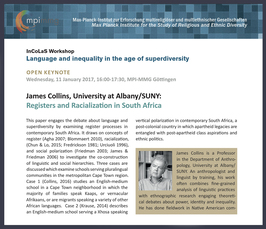"Registers and Racialization in South Africa"
InCoLaS Workshop "Language and inequality in the age of superdiversity" : Keynote Lecture
- Datum: 11.01.2017
- Uhrzeit: 16:00 - 17:30
- Vortragende(r): James Collins (University at Albany/SUNY)
- Ort: MPI-MMG, Hermann-Föge-Weg 11, Göttingen
- Raum: Library Hall

He has collaborated with colleagues in Belgium in ethnographic and sociolinguistic research on migration and language contact in Flanders, and most recently, undertaken a comparative study of language diversity, civil rights, and social inequality in South Africa and the United States, as part of a Fulbright teaching/research grant to Cape Town, South Africa. His publications include Understanding Tolowa History: Western Hegemonies and Native American Responses (Routledge, 1997); Literacy and Literacies: Text, Power, and Identity (Cambridge, 2003); and Globalization and Language Contact: Scale, Migration, and Communicative Practices (Continuum, 2009); as well as numerous articles, chapters, and essays.
For more details please contact esser(at)mmg.mpg.de.
This paper engages the debate about language and superdiversity by examining register processes in contemporary South Africa. It draws on concepts of register (Agha 2007; Blommaert 2010), racialization, (Chun & Lo, 2015; Fredrickson 1981; Urciuoli 1996), and social polarization (Friedman 2003; James & Friedman 2006) to investigate the co-construction of linguistic and social hierarchies. Three cases are discussed which examine schools serving pluralingual communities in the metropolitan Cape Town region. Case 1 (Collins, 2016) studies an English-medium school in a Cape Town neighborhood in which the majority of families speak Kaaps, or vernacular Afrikaans, or are migrants speaking a variety of other African languages. Case 2 (Krause, 2014) describes an English-medium school serving a Xhosa speaking community in the Khayelitsha settlement. Case 3 (Kerfoot, 2014) describes a multilingual school serving Afrikaans and Xhosa speaking students in the township of Delft with a school-language policy that privileges neither.
Examining language policy, classroom interaction, and school staff and out-of-school commentary about the language diversity present at each site, analysis of the cases focuses on a tension between standardizing and vernacularizing impulses in classroom and out-of-school settings. It discusses register-stabilizing as well as register-challenging processes emerging from the school settings, and how speakers are recruited to (standard and vernacular) registers of Xhosa, Afrikaans, and English, the three official languages of the Western Cape. It contextualizes the case studies in an argument about the global system dynamics of horizontal and vertical polarization in contemporary South Africa, a post-colonial country in which apartheid legacies are entangled with post-apartheid class aspirations and ethnic politics.